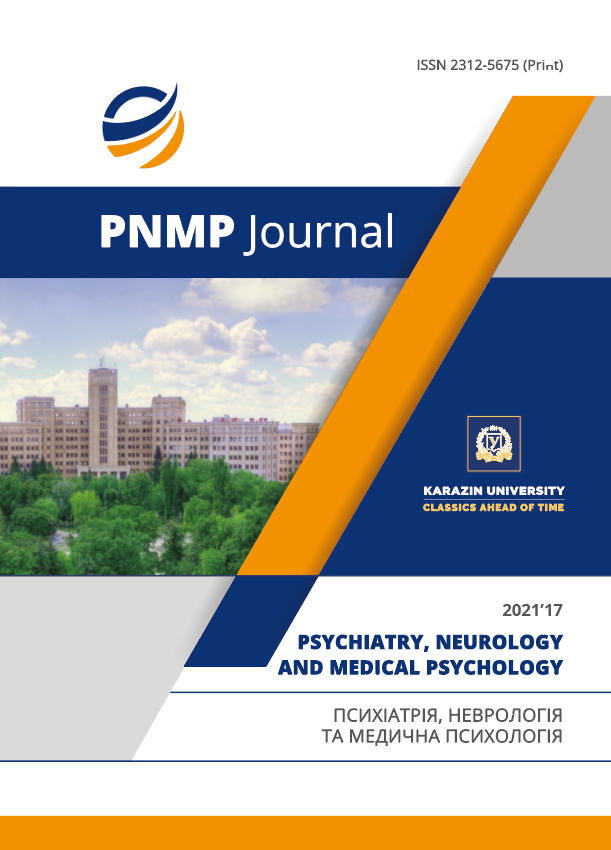The influence of the dimensions of perfectionism on the formation of emotional maladjustment
Abstract
The growing complexity of the medical profession places increased demands on the future physician’s adaptive capacity. The problem
of the relationship of the aff ective spectrum disorders with such a dysfunctional personality trait as perfectionism is intensively discussed
in clinical psychology. Medical students are in a more diffi cult position than others. It’s related to their future profession requires a high
level of training and also associated with a high responsibility for the lives and patient’s health. High pace, intense workload, stress of life
makes increased demands on the compensatory mechanisms of the medical student’s psyche, failure of which leads to psychological and
social confl icts.
The paper presents an empirical study of the severity of symptoms of depression, anxiety, and daily stress as the main components
of emotional maladaptation, depending on the level of perfectionism in the medical student environment in conditions of increased
psychological stress and pre-examination stress. Subjects with a low level of perfectionism are as emotionally prosperous as possible -
they have no signs of depression in 89% of cases. In the group of subjects with a medium level of perfectionism, the number of respondents
in whom there are no signs of depression decreases and the number with mild, moderate and high levels of depression increases. In the
group with a high level of perfectionism, the number of people without signs of depression is half of the whole group, a sharp increase in
the number of subjects with moderate and high levels of depression. The level of depression in all three groups is statistically signifi cantly
diff erent from each other: the lowest in the group with a low level of perfectionism and the highest in the group with a high level of
perfectionism (p <0.001). Positive correlations between the general indicator of perfectionism, its separate parameters and indicators of
depression, anxiety and daily stress in the studied groups are revealed.
The data obtained as a result of the study confi rm the high level of emotional maladaptation of medical students. In the academic
student medical environment, respondents with a pronounced level of perfectionism experience more high-intensity, daily stress (both in
the interpersonal and academic spheres of student life) compared to respondents with moderate and low levels of perfectionism.
Downloads
References
Biasi V., Cerutti R., Mallia L., Menozzi F. et al. (Mal)Adaptive Psychological Functioning of Students Utilizing University Counseling Services. Front Psychol. 2017. No. 8, p. 403. https://www.doi.org/10.3389/fpsyg.2017.00403|
Byrd, D. R., and McKinney, K. J. Individual, interpersonal, and institutional level factors associated with the mental health of college students. J. Am. Coll. Health. 2012. No. 60, pp. 185–193. https://www.doi.org/10.1080/07448481.2011.584334
Oostdam R. J. M. J. C. Koerhuis M. J. C., Fukkink R. G. Maladaptive behavior in relation to the basic psychological needs of students in secondary educatio. European Journal of Psychology of Education. 2019. No. 34, pp. 601–619. https://www.doi.org/10.1007/s10212-018-0397-6.
Haustov M. M. Sistematizacіya chinnikіv riziku formuvannya stanіv dezadaptacії u studentіv v suchasnih umovah. Scientifi c journal «Science rise: medical science». 2017. No.10 (18), pp. 44-48. [in Ukr.] https://www.doi.org/10.15587/2519-4798.2017.113511.
Barnett D. A Grounded Theory for Identifying Students with Emotional Disturbance: Promising Practices for Assessment, Intervention, and Service Delivery. Contemporary School Psychology: Formerly «The California School Psychologist. 2012. No. 16, pp. 21–31.
Sirota N. A., Moskovchenko D. V., Yaltonsky V. M., Yaltonskaya A. V. The Role of Emotional Schemas in Anxiety and Depression among Russian Medical Students. Psychology in Russia: State of the Art. 2018. Vol. 11(4), pp. 130–143. https://www.doi.org/10.11621/pir.2018.0409.
Garanyan N. G., Holmogorova A. B., YUdeeva T. YU. Perfekcionizm, depressiya i trevoga. Moskovskij psihoterapevticheskij zhurnal. 2001. No. 4, pp. 18–48. [in Russ.]
Loza O. O. Perfekcіonіzm students’koї molodі: rіven’ virazhenostі ta predstavlenіst’ u budennіj svіdomostі. Vіsnik Dnіpropetrovs’kogo unіversitetu іmenі Al’freda Nobelya. Serіya : Pedagogіka і psihologіya. 2014. No. 1, pp. 28–32. [in Ukr.]
Zavada T. Osoblivostі vzaєmozv’yazku perfekcіonіzmu ta samoaktualіzacії osobistostі. Vіsnik Kiїvs’kogo nacіonal’nogo unіversitetu іmenі Tarasa Shevchenka. Psihologіya. 2014. No. 2, pp. 31-34.
Hewitt P.L., Dyck D.G. Perfectionism, stress, and vulnerability to depression. Cognitive Therapy and Research. 1986. No. 10, pp. 137–142.
Hewitt P., Flett G. Perfectionism and stress process in psychopathology. Perfectionism: Theory, research, and treatment. Washington, 2002, pp. 255-284. https://www.doi.org/10.1037/10458-011.
Hewitt P.L., Flett G.L. Dimensions of perfectionism, daily stress and depression: a test of specifi c vulnerability hypothesis. II Journal of abnormal psychology. - 1993. Vol. 102(1), pp. 58-65.
Hamilton T., Schweitzer, R. The cost of being perfect : perfectionism and suicide ideation in university students. Australian and New Zealand Journal of Psychiatry. 2000. Vol. 34 (5), pp. 829–835. https://www.doi.org/10.1080/j.1440-1614.2000.00801.
Karamushka L. M., Bondarchuk O. І., Grubі T. V. Dіagnostika perfekcіonіzmu ta trudogolіzmu osobistostі : psihologіchnij praktikum. Kam’yanec’-Podіl’s’kij : Medobori, 2018. 64 p. [in Ukr.]

